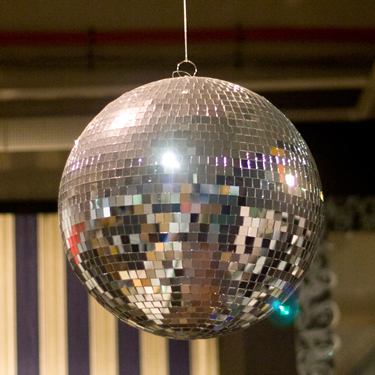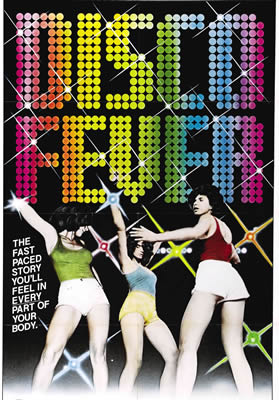
arts
Got Disco Fever
[Studio 54] is the embodiment of the most decadent social period of any city in modern history. By 1978, New York was headlong into an era of staggering permissiveness.
So said a patron of the very hip, very celebrity-packed New York City
disco club
 Feel the beat! Baby boomers flocked to the clubs.
Feel the beat! Baby boomers flocked to the clubs.
Fashion rules. Better be preened to perform. Gold lamé, leopard skin, sequin bandeau tops, satin jackets and stretch halter jump suits are the tickets in. Exclusive disco hot spots, like Studio 54, established the first rock music dress codes and door screenings. Opened in 1977, everyone and his mother (Lillian Carter, mother of President Jimmy Carter) made the scene there.
Dance floors pulsated with multi-media effects, non-stop party music, and plenty of drugs, especially the type that could keep you groovin’ and hormonal all night—cocaine, methamphetamines, Ecstasy. And to calm down before going up again—Quaaludes and Valium. The “dance till you drop” disco scene was the baby boomer highway from 1960s social consciousness to 70s sexual consciousness.
Discothèques sprouted everywhere. Many movers and shakers were young, gay or black (or all) boomers, doing the Vogue and Stayin’ Alive. Sundays at Studio 54 specifically catered to a gay crowd.
Disco was the perfect baby boomer storm—the sexual revolution, celebrity worship, and the nascent “me generation” rolled into one self-indulgent glittering ball. Who was spotted at the club? The question was who was not. Be there or be square.
 From first note, disco faced hostility. It’s fake, light and synthetic, critics sneered. Boomer rock music remained earthy and masculine—Under My Thumb and Bad to the Bone. Or infused with social consciousness—Give Peace a Chance and Everybody Get Together. Hard-pounding psychedelia took no prisoners. Heavy Metal was about to smash onto the stage. In Dancing Fool, Frank Zappa parodied disco music as silly and effeminate. Radio DJs and bumper stickers shouted “Disco sucks!”
From first note, disco faced hostility. It’s fake, light and synthetic, critics sneered. Boomer rock music remained earthy and masculine—Under My Thumb and Bad to the Bone. Or infused with social consciousness—Give Peace a Chance and Everybody Get Together. Hard-pounding psychedelia took no prisoners. Heavy Metal was about to smash onto the stage. In Dancing Fool, Frank Zappa parodied disco music as silly and effeminate. Radio DJs and bumper stickers shouted “Disco sucks!”
July 12, 1979 is often cited as “The Day Disco Died.” Between games of a Chicago White Sox doubleheader, two local DJs supported by team owners staged a well-publicized raucous anti-disco event culminating in a giant explosion of disco records. Rioting and arrests ensued. Game two was forfeited. No matter, the Sox were out of the pennant race that year.
The disco backlash mushroomed. Less and less of the sound appeared on Top 40 radio stations. Disco ruled baby boomer pop culture for a time. It turned out to be a fad, however intense. The fashions became moth munchies in the backs of closets.
Trivia Factoids
There’s a thriving vintage collectibles fashion market on eBay. Boomers can’t give it up.
For years, Dick Clark refused to reveal his favorite music for concern it would reveal a prejudice. Now retired, he’s let the disco cat out of the bag.
Characters on the television hit That 70s Show, depicting the lives of young baby boomers during the era, are always trashing disco. In one episode, the kids talk about a ceremonial burning of the records.
Got a 400 word travel piece you'd like to contribute? Click here.
© 2006-2013 ConceptDesign, Inc. Terms of Use
BoomSpeak - For babyboomers - by babyboomers.